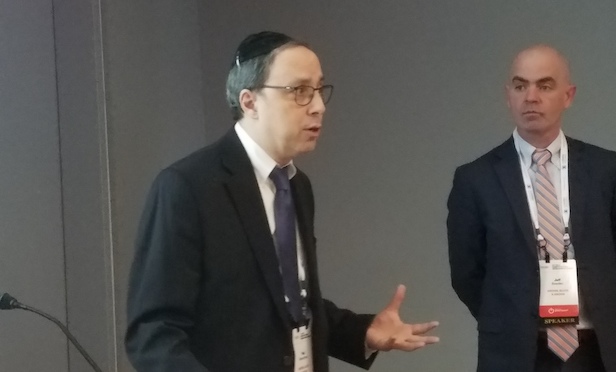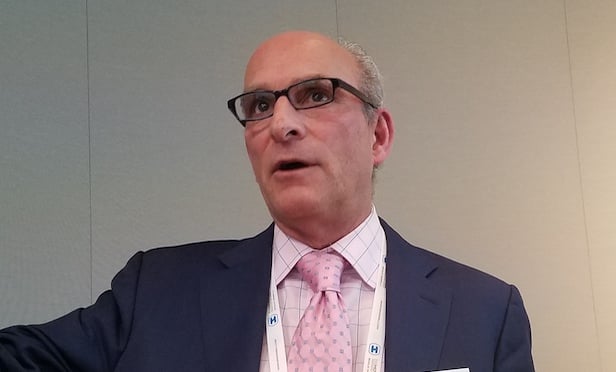 (From left: Paul Gevertzman, Jeff Bowden)/ Photo by Betsy Kim
(From left: Paul Gevertzman, Jeff Bowden)/ Photo by Betsy Kim
NEW YORK CITY—The government saw about six trillion dollars of unrealized capital gains, so that's why the Opportunity Zones program is tied to capital gains, said Paul Gevertzman, a tax partner at Anchin Block & Anchin, the largest single public accounting firm in the country.
With prior governmental programs encouraging private investing in distressed areas, people looked to exit shortly after making investments. Thus, this program incentivizes longer commitments noted Gevertzman.
At Anchin's fifth annual Construction and Development Forum, Gevertzman, and his colleagues tax principal Jeff Bowden, and Marc Wieder, partner and co-leader of the firm's real estate practice, pointed to key Opportunity Zone tax takeaways.
What can be invested in a Qualified Opportunity Zone?
Bowden stated any capital gain, for example, the sale of stocks, bonds, art, personal residences or airplanes, can get the benefits of being invested in a Qualified Opportunity Zone Fund. When the gain is realized, you have 180 days to invest it into a Qualified Opportunity Fund (QOF).
Wieder clarified that the entire capital gain does not have to be invested. “If you had $1,000,000 gain you don't have to roll a million dollars. You can roll $500,000. You can roll $1,” he said. “Whatever you roll into your QOF which goes into a Qualified Opportunity Zone investment is the amount you are deferring. The rest you are going to pay tax on currently.”
Gevertzman emphasized non-capital gains funds can be invested in QOFs but they won't receive any tax benefits.
 Marc Wieder, partner and co-leader, Anchin's real estate group/ Photo by Betsy Kim
Marc Wieder, partner and co-leader, Anchin's real estate group/ Photo by Betsy KimWhat fits the definition of Qualified Opportunity Fund?
Wieder pointed out any entity taxed as a partnership or a corporation can be a QOF but it cannot be a single member LLC.
The QOF can be as simple as a husband and wife owning property jointly. “Two brothers or a brother and sister, all they would need to do is form an LLC or a corporation to qualify as an Opportunity Zone Fund. Then that fund needs to make an investment in a Qualified Opportunity Zone property within 180 days,” stated Bowden.
Benefits recapped
The Anchin team pointed out that a certain portion of the deferred gains will be excluded from taxation if the QOF investment is held up to five years, with an even greater amount excluded from taxation if the investment is held up to seven years. Plus, all appreciation in an investment (above the deferred gain recognized no later than 2026) can be excluded from taxation if the investment is held for 10 years.
Pay attention to timing for investing capital gains.
Gains must be realized before investing in a QOF. An investor then files this information with his or her tax return. Once this is done, the investor cannot go back and make another election to invest in another QOF with respect to that same gain. Investors could opt to file for a tax extension to select all Opportunity Zone investments prior to filing tax forms.
Taxes Will Be Due in 2026
A common misconception is that people think if they hold an investment for 10 years, they are never paying any tax.
“No, in 2026 you are paying tax on some portion of that original gain. That day of reckoning is coming,” said Wieder. “So you'd better have money or be prepared to have money, come 2026 to pay tax for 100% of that gain if the investment has been held for less than five years or as low as 85%, if the investment has been held for at least seven years. If the investment is held for five years, coming 2026, the 90% of the gain will be taxable.”
“For a typical real estate deal, what you are going to hope happens is that within that seven year period of time they are going to be able to refinance, distribute out some money and at least distribute out enough to you to be able to pay your taxes in 2026—this is what you're hoping to do in any of those deals, then be able to get out after the 10 year period. Just keep in mind in 2026 you are paying something,” he added.
© Touchpoint Markets, All Rights Reserved. Request academic re-use from www.copyright.com. All other uses, submit a request to [email protected]. For more inforrmation visit Asset & Logo Licensing.







